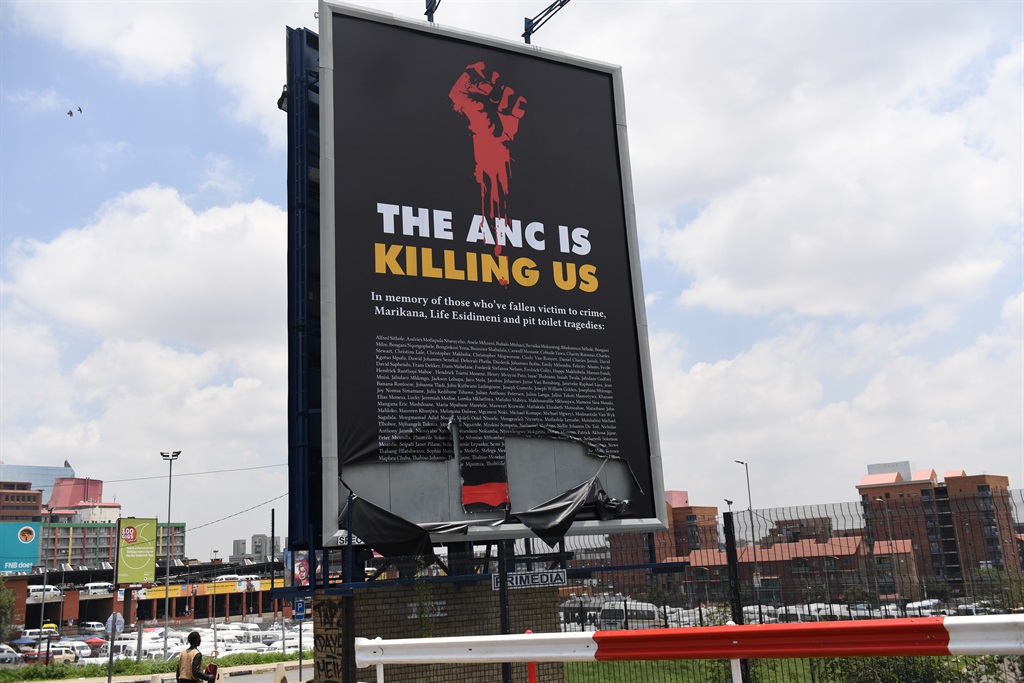
Earlier this month, a billboard describing a political party as killers was erected.
The names of those shot dead in the Marikana Massacre, children who died in pit toilets and also the victims of the Life Esidimeni Tragedy, in which 144 mental healthcare users lost their lives, were listed on the billboard.
The aim of this was, purportedly, to demonstrate how the political party against whom the billboard was erected was a culpable organisation and a catalyst for these deaths. This has since been called grandstanding and exploitation of tragic events and of the people who died as a result of them.
Indeed, it is undoubtedly no accident that the billboard was erected in an election year. Unsurprisingly, the erection of this structure was a source of great anger to many and the billboard was vandalised soon after it was put up. Those who committed the act were identified as family members of individuals who died in the Life Esidimeni Tragedy.
The questions thus arise as to whether political parties should be using these tragedies and human rights violations to score votes if not, what they ought to be doing instead?
Pointing fingers is part of the parlance of politicians. It is a means through which votes are won. Dramatic and eye-catching statements make a party seem attractive to people because they create the impression that the party making the statement will improve the lot of those in need and solve the problems of the country.
Using the names of the victims of the Life Esidimeni tragedy for this purpose is rather manipulative and conniving, and unacceptable in a democratic society. On the flip side, the commemoration of the lives of people who met a sad, unwarranted and needless end is a form of the payment of homage to these individuals.
Roads, airports, parks, institutions of learning and many other public spaces bear the names of fallen heroes.
If the aim of such acts was to use these tragic events as a means of showing that these lives did not end in vain and that it intends taking up the cudgels and holding those responsible to account, then they should be applauded. But what a strange coincidence that they sought that applause when the vote count is at stake.
The South African Federation for Mental Health welcome the efforts and political will to make mental health a priority for all in South Africa (if indeed this was the intention).
Since 2015 questions were raised in the Gauteng legislature about the deaths of mental healthcare users when they were moved from long-stay hospitals into ill resourced non-governmental organisations and various costly investigations and commissions were held which revealed the poor state of mental health not only in Gauteng but in all provinces.
Three years later very little progress has been made to improve mental health services. Licenced and legally operating non-governmental organisations continue their struggle to raise funds to provide dignified care to the vulnerable as state subsidies have not yet been adequately adjusted to ensure that vulnerable and impoverished communities receive the care they deserve.
There is no proper monitoring and data capturing system to prevent further tragedies. Government departments continue to work in silos despite the call for a multi-sectoral collaboration in addressing mental healthcare services.
Instead of proper and meaningful engagement with stakeholders, parties draw communities into political campaigns. Accusations and lists are ineffectual and mean nothing if not accompanied by the provision of a constructive way forward. We need to know whether there is political will, specifically how they would serve vulnerable individuals such as mental healthcare users.
This is an important consideration because now that the gaps in policy and practical service delivery have been exposed, the time has come to cohesively and comprehensively close all of these gaps. That should be the forefront of the agenda – not more finger-pointing and climbing on to high horses.
We therefore call upon all political parties to put forward in their manifestos details as to how mental health will be propelled to the forefront of the agenda and how action items will be carried out to ensure that mental healthcare users receive the services they require.
It is at this juncture that it becomes extremely important for constituents to decide what they want. Voters need to begin to set the agenda and demand change and demand that political parties come up with propositions to facilitate the changes that are needed.
They should not listen to bald statements from politicians decrying the actions of another and affixing labels to them; they should rather ask the political parties for answers. To demonise a specific group is not constructive and constituents should not be fooled by attempts to do so.
Billboards should seek to root out the rotten apples by saying what the party erecting it wants to do. Constituents must recognise the need to cast their vote through applying their minds to the policy choices their representatives want to make and should challenge political parties to give them what they want in terms of their constitutional rights.
Election years are a time of jockeying for position and parties will fight to gain traction in whatever way they can. This muddies the waters and can often lead to a positive message getting lost.
There is nothing wrong with raising awareness of the plight of the victims of tragedies, but there is a problem with simply being problem-oriented and casting aspersions on another. We call on politicians to take cognisance of the need to add value and to spark debate, not simply to climb on their soapboxes.
• Patel is national executive director of the South African Federation for Mental Health and Breen is the federation’s project leader for information and awareness.




 Publications
Publications
 Partners
Partners








